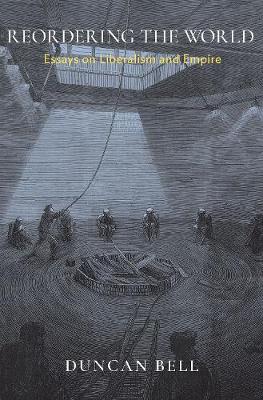
Stock image for illustration purposes only - book cover, edition or condition may vary.
Reordering the World: Essays on Liberalism and Empire
Duncan Bell
€ 58.31
FREE Delivery in Ireland
Description for Reordering the World: Essays on Liberalism and Empire
Hardback. Num Pages: 416 pages. BIC Classification: HBTQ; JPA; JPF. Category: (P) Professional & Vocational; (U) Tertiary Education (US: College). Dimension: 229 x 152. .
Reordering the World is a penetrating account of the complexity and contradictions found in liberal visions of empire. Focusing mainly on nineteenth-century Britain--at the time the largest empire in history and a key incubator of liberal political thought--Duncan Bell sheds new light on some of the most important themes in modern imperial ideology. The book ranges widely across Victorian intellectual life and beyond. The opening essays explore the nature of liberalism, varieties of imperial ideology, the uses and abuses of ancient history, the imaginative functions of the monarchy, and fantasies of Anglo-Saxon global domination. They are followed by illuminating studies of prominent thinkers, including J. A. Hobson, L. T. Hobhouse, John Stuart Mill, Henry Sidgwick, Herbert Spencer, and J. R. Seeley. While insisting that liberal attitudes to empire were multiple and varied, Bell emphasizes the liberal fascination with settler colonialism. It was in the settler empire that many liberal imperialists found the place of their political dreams. Reordering the World is a significant contribution to the history of modern political thought and political theory.
Product Details
Publisher
Princeton University Press
Format
Hardback
Publication date
2016
Condition
New
Weight
786g
Number of Pages
456
Place of Publication
New Jersey, United States
ISBN
9780691138787
SKU
V9780691138787
Shipping Time
Usually ships in 15 to 20 working days
Ref
99-15
About Duncan Bell
Duncan Bell is Reader in Political Thought and International Relations at the University of Cambridge and a Fellow of Christ's College. His books include The Idea of Greater Britain: Empire and the Future of World Order, 1860-1900 (Princeton).
Reviews for Reordering the World: Essays on Liberalism and Empire
Bell's masterful study represents one of the best efforts yet to untangle the many ideological and political knots that bind liberalism and imperialism.
G. John Ikenberry, Foreign Affairs In what is a preeminent study of the social and political construction of the world, Bell goes way beyond the typical discussions by demonstrating the shifting definitions of empire and the political ramifications of conquest. In a detailed historical and political analysis of colonial interventions in human history, he meticulously 'unpicks' the connections that lie at the heart of both imperialism and human freedom. It is indeed a brilliant amalgam of history and politics, thought-provoking and relevant at a juncture when the nation and its concept are subjects of passionate, wide-reaching debate and of profound interest to sociologists and postcolonial theorists.
Shelley Walia, Frontline In this collection of articles and essays, Bell achieves an impressive synthesis of liberal political thought and British ideologies of empire.
Choice
G. John Ikenberry, Foreign Affairs In what is a preeminent study of the social and political construction of the world, Bell goes way beyond the typical discussions by demonstrating the shifting definitions of empire and the political ramifications of conquest. In a detailed historical and political analysis of colonial interventions in human history, he meticulously 'unpicks' the connections that lie at the heart of both imperialism and human freedom. It is indeed a brilliant amalgam of history and politics, thought-provoking and relevant at a juncture when the nation and its concept are subjects of passionate, wide-reaching debate and of profound interest to sociologists and postcolonial theorists.
Shelley Walia, Frontline In this collection of articles and essays, Bell achieves an impressive synthesis of liberal political thought and British ideologies of empire.
Choice
